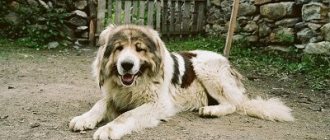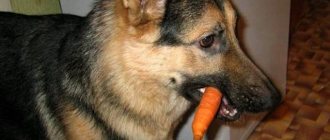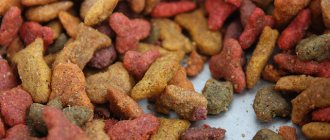German Shepherds are strong, tough and resilient animals. But dogs of this breed have a weak digestive system and are prone to stomach diseases, diarrhea and constipation. How and what to feed shepherd dogs at home, from a young age to old age, how much food to give dogs per day, and what rules should be followed when feeding them?
Proper nutrition for a German Shepherd: tips and tricks
To keep your dog healthy and active, you must adhere to the following rules:
- it is important to follow a diet and feed at the same time;
- Do not give shepherds food that is too hot or cold; food should be slightly warm, especially in winter;
- dogs should be fed after walks, exercise or training;
- The pet should eat a single portion of food within twenty minutes. If after a meal there is food left in the shepherd’s bowl, it is removed and the portion size is slightly reduced;
- To prevent the puppy from having problems with posture and curvature of the spine, the bowl of food is placed at the height of his chest. The elevation level is raised as the animal matures;
- Dogs should always have fresh boiled water in their bowl.
Important: dogs of this breed are prone to gaining excess weight and obesity. Therefore, the main rule is not to overfeed your pets.
Feeding a German Shepherd puppy: how and what to feed
Both ready-made food in the form of granulated dry food and food prepared from natural products are suitable for feeding a puppy. What type of food to give preference depends on what the baby ate from the previous owner and feed him according to the same scheme. If the owner decides to switch the puppy from dry food to natural feeding or vice versa, then this should be done gradually, since a sudden change in diet will cause digestive problems in the dog.
The transition from one diet to another should be gradual
Rules for feeding a puppy dry food
Many breeders and owners opt for industrial food, because high-quality dry food contains not only meat and vegetables, but also microelements necessary for the normal growth and development of a puppy.
In addition, the packaging of the finished food indicates the recommended daily portion of food for the baby, which relieves the owner of the need to independently calculate the dosage and ratio of products.
But when choosing this type of feeding, it is worth considering the following factors:
- Buy ready-made food designed specifically for puppies, not adult dogs;
- do not skimp on your small pet’s health by offering him cheap, economy-class food, because such food is made from low-quality ingredients and does not contain vitamins;
- Strictly follow the dosage of food indicated on the packaging. Dry pellets are quite high in calories and overfeeding pups at an early age will lead to the development of obesity in the future.
If the puppy does not finish the portion of food, this indicates that it is too large for him and should be reduced.
Features of feeding a puppy natural food
High-quality industrial food is not cheap, so many owners prepare food for their pet from natural products, saving their budget.
This type of feeding has its advantages: the owner is always confident in the freshness and quality of the ingredients, and the baby’s menu is much more varied than when feeding only dry granules.
What foods should be included in your puppy's diet:
- meat and offal (especially liver);
- milk and fermented milk products: cottage cheese, yogurt, kefir;
- eggs, both raw and boiled;
- fresh and raw vegetables;
- boiled sea fish;
- cereal porridge;
- fruits, berries and herbs in limited quantities.
Important: you cannot mix natural food with dry food in the same plate, because this can cause bloating and gastrointestinal diseases in puppies.
Water in a puppy's diet
All living things in nature need liquid. Water is necessary for the processes of hematopoiesis, cell function, and organ structure. Without water, a puppy can die in three days, and its lack in the diet will affect its health.
How much the puppy drinks is up to him. The owner is required not to limit it in water and change it more often, due to saliva and food debris accumulating there. Natural food already contains a lot of liquid, so puppies drink significantly less on this type of feeding.
If there is confidence in the normal quality of tap water (the owner can drink it himself), then it will also be suitable for the puppy. In other situations, the dog is given filtered or bottled water. The puppy should have clean water both day and night. Puppies love to play with water and often turn the bowl over, so it is placed in a dog feeding station.
How a puppy grows up depends on many factors, and proper feeding is one of them. With any type of nutrition, the shepherd dog must have high-quality food, and the nutrition itself must be adjusted according to the regime and without concessions on the part of the owner and family members.
How to properly feed a German Shepherd puppy: feeding schedule and daily food dosage
For three weeks from the moment of birth, the baby feeds exclusively on mother's milk. After this period, the puppies begin to be fed meat, cereals and fermented milk products, gradually accustoming them to adult food. Starting from the age of two months, the bitch stops feeding the puppies, and they completely switch to solid food.
From one month to one year, the baby actively grows, the formation of muscle and cartilage mass, skeleton and immunity. And the owner’s main task during this period is to provide the small pet with proper and balanced nutrition. Moreover, it is important not only to choose a good diet, but also to adhere to the puppy’s feeding schedule.
How much and how often to feed puppies of different ages:
- In the first 2 months, babies eat six times a day. The daily food intake is one glass, which is divided into six equal servings;
- The dosage of food for three-month-old puppies is increased to one and a half glasses of food. Pets are fed up to five times a day;
- From the age of 4 months, the puppy is transferred to four meals a day. The recommended dose of food per day is two glasses;
- The frequency of feeding puppies from 5 to 6 months is reduced to three times a day. The daily serving volume should be one liter of food;
- from 6 months to a year, the dog continues to be fed three times a day, and the norm for a single serving is half a liter of food;
If there is a need for additional feeding of puppies at the age of two to three weeks, for example, when the bitch has little milk, then the frequency of feeding them should be five to six times a day. They feed babies with cow's milk or, even better, goat's milk from a bottle or syringe, or use baby formula for this purpose.
Important: the break between feeding puppies from one to six months should not exceed two to four hours.
Feeding German Shepherd puppies: diet for babies from a month to a year
The food for small pets consists of the same ingredients as the menu for adult dogs, the only difference is in the method of preparation and processing of the products.
Puppies at the age of 1 month are given milk, minced meat (raw or boiled) and liquid porridge cooked in milk.
Two-month-old babies are fed porridges, to which mashed boiled grated vegetables or pieces of meat, cottage cheese and kefir are added.
The diet of pets who have reached three months of age includes offal (liver, kidneys) and minced boiled river fish. Milk is replaced with kefir or yogurt.
Four-month-old pets are given porridge, raw meat and liver, eggs, fermented milk products and periodically fed with boiled cartilage and veal bones.
At the age of 5-6 months, the puppies' menu consists of meat, thick porridges cooked in water or meat broth, cottage cheese, eggs, sea fish fillets, fruits and vegetables.
Starting from the age of six months, the diet of German Shepherd puppies should be the same as that of an adult dog, that is, half consist of meat and offal, and half of a combination of cereals, vegetables and dairy products.
Food for a puppy should be varied, so it is advisable to alternate types of meat, cereals and vegetables. For example, if a little pet’s meal consisted of rice porridge with chicken and zucchini, the next day he is offered buckwheat porridge with minced beef and carrots.
Is it possible to give bones and what kind?
It is recommended that German Shepherd puppies be given bones as they help sharpen and clean their teeth and also massage their gums.
But not all bones can be given to a puppy. Sharp tubular bones, which a dog can easily chew, can damage the larynx, esophagus and stomach with their fragments. Therefore, it is strictly prohibited to feed dogs chicken and rabbit bones .
Dogs can be given:
- Tubular bones of beef or lamb.
- Beef moslaki or large joints.
It is not advisable to give boiled bones , since heat treatment changes the structure of the bone tissue, and as a result they are poorly digested.
Principles of feeding adult shepherd dogs
One-year-old German Shepherds are fed two meals a day. At 1 year of age, the daily norm of natural animal feed is one and a half liters, which is divided into two times. It is recommended to feed dogs in the morning and evening, strictly at the same time, so that the pets do not have digestive problems.
Meat is the main food product for animals, so it must be present in their daily menu. But it is impossible to feed an adult shepherd exclusively with meat products, because for the normal functioning of the digestive system, animals need not only proteins, but also carbohydrates.
The daily food intake for shepherd dogs is compiled according to the following principle:
- 50% proteins (meat, offal, eggs, cottage cheese);
- 30% carbohydrates (porridge, vegetables and fruits, which contain fiber);
- 20% fat, animal or vegetable origin.
For proper development and health, it is necessary to maintain a balance of fats, proteins and carbohydrates.
Experts recommend forming a daily menu for adult pets based on the character and lifestyle of dogs.
Mobile and active choleric and sanguine shepherd dogs need more carbohydrates to replenish their energy supply.
Animals belonging to the calmer type of phlegmatic and melancholic people should receive more protein and fast carbohydrates, and fatty high-calorie foods are contraindicated for them.
The diet of dogs involved in police service and border troops is supplemented with additional amounts of carbohydrate food (vegetables, cereals) to provide their body with energy. They also increase the calorie content of food for shepherd dogs that live in an open enclosure in the winter.
Pets kept in an apartment and leading a sedentary lifestyle are fed food rich in protein (meat and offal), and carbohydrates and fats are given in limited quantities, otherwise the animals may risk obesity.
Important: it is advisable to create a daily menu in such a way that you give the dog lighter food in the morning, and in the evening feed it nutritious and high-calorie food.
Healthy cereals
- One of the healthiest cereals is buckwheat. It has a positive effect on the dog's metabolism. It also contains leucine, which is an excellent preventive measure for liver disease. But it is recommended to give buckwheat porridge with caution, as it can cause allergies in some dogs.
- Rice stimulates digestion and is perfectly absorbed by the body. It is often prescribed for poisoning, allergies and diseases of the digestive system.
- Many German Shepherd owners cook oatmeal for their pets.
However, oatmeal or flakes can cause an eating disorder, and in sedentary dogs, obesity. It is recommended to give oatmeal only in combination with buckwheat or rice.
The life and health of a German Shepherd puppy directly depends on its owner. Failure to follow nutritional recommendations for puppies, feeding low-quality cheap food, and eating prohibited foods for your dog can lead to the development of various diseases.
Feeding your German Shepherd natural food
Experienced German owners are confident that natural food is better suited for feeding these dogs. When feeding natural food, animals receive all the elements necessary for the normal functioning of the body, and their menu has a varied composition.
Meat, vegetables. porridge, eggs, greens, fish must be present in the diet but
What products should a German Shepherd's natural diet consist of:
- meat and offal
. Animals are fed chicken, beef, rabbit, lamb, and lean pork. It is recommended to give your pets beef kidneys, heart and liver; - cereal porridge
. Rice, oatmeal, barley and buckwheat will be beneficial for dogs; - vegetables
. Their menu includes carrots, zucchini, tomatoes, pumpkin, celery, and beets; - sea fish
. You can feed your pets hake, mackerel, tuna, flounder, pollock; - dairy products
. Dogs are given fermented baked milk, cottage cheese, yogurt and natural yoghurts without additives or fillers; - fruits
. Shepherd dogs are not averse to eating apples, watermelon pulp, apricots and strawberries; - eggs
. Chicken, quail and turkey eggs are suitable for feeding; - greenery
. Chopped parsley, spinach, celery and lettuce are added to dishes in small quantities.
Methods of preparation and processing of products
To properly feed a German Shepherd, the owner should know how to prepare meals for the pet and what foods to combine.
Meat and offal
Beef, chicken, lamb and rabbit are cut into small pieces and fed raw to dogs. Pork should be boiled or scalded with boiling water. It is also advisable to boil offal, only the liver can be given raw.
Meat and offal are the main component of a shepherd's diet.
Porridge
Cereals are cooked in meat broth or water, since porridges cooked in milk cannot be given to adult animals, this leads to diarrhea. Porridge can be mixed with meat and vegetables.
Vegetables
They are offered to dogs raw, baked or boiled. Tomatoes must be peeled, otherwise it can clog the shepherd’s stomach and cause digestive problems.
Fish
It is advisable to boil the fish fillet and thoroughly remove the bones. Fish is given to dogs no more than twice a week.
Eggs
Eggs can be fed to dogs raw or boiled, but experts recommend feeding egg whites only raw. These products are introduced into the animal menu twice a week.
Raw egg can be added to porridge
All ingredients for dog food must be of high quality and fresh. Before cooking, fruits, vegetables, meat, fish and herbs are washed.
It is unacceptable to feed shepherds rotten and rotten foods or give them cottage cheese and kefir with an expired expiration date.
Meat and offal
Meat is one of the most important components in the natural feeding of an adult shepherd dog. The most valuable is the muscle tissue of meat. It is she who works on myosin and actin, which are needed for the full development of the pet. These proteins are perfectly balanced in amino acid content. Connective tissues are less valued. Especially collagen and elastin. Meat also contains beneficial B vitamins, and it also contains vitamin E. Since meat is rich in protein, it can provide your pet with strength and energy.
Depending on the shepherd’s preferences, meat can be given either raw or boiled. It's very easy to prepare. It is enough to boil a whole piece in cold water and cut into square pieces. If we are talking about raw meat, then before serving it is necessary to rinse it well under running clean water. It is preferable to feed German Shepherds veal, beef, chicken or turkey. Pork is prohibited. It is also not recommended to feed your pet minced meat, as it is poorly absorbed in the body.
Cereals
A German Shepherd's diet may also include porridge. The technology for preparing cereals is typical. Usually the product is sifted or washed and then cooked until cooked. The best cereals for dogs are buckwheat and rice. They contain many useful elements, for example, buckwheat is rich in iron, and rice helps strengthen the digestive system and saturates the bird’s body with B vitamins. Oatmeal takes second place in the list of favorite cereals. It will be easy for your dog to eat porridge and at the same time receive a dose of unique amino acids, proteins and fats. To avoid allergies and make sure that the porridge has “taken root”, it is necessary to give one type for several days.
Many pets love an assortment of several types. There are oatmeal lovers. It must be introduced into the diet carefully. This porridge causes indigestion attacks in our four-legged friends more than others.
Cook porridge in water. If your German Shepherd refuses to eat, then you should try giving Hercules flakes, which you can simply add water and wait for them to swell.
Feeding your German Shepherd dry food
By choosing dry food to feed a German Shepherd, the owner greatly simplifies his life and saves his time. After all, he does not need to prepare fresh porridge for his pet every day, cut meat and vegetables, and at the same time calculate the daily intake of proteins, carbohydrates and fats.
But not all ready-made food has a high-quality and balanced composition, so when choosing this type of food, the owner needs to study the contents of the packaging and the ratio of ingredients.
Industrial feeds are divided into four categories.
Holistics
Elite, expensive holistic-class food is made from meat, fruits, plant components and even contains extracts of medicinal herbs. By eating such food, the shepherd dog receives all the necessary components and vitamins, so this food has received positive reviews from both experienced breeders and veterinarians.
Super premium
Super premium food contains ingredients such as fresh meat, vegetables, vitamins and microelements. The range in this category includes food for both adult dogs and puppies.
You shouldn’t skimp on dry food, but given the fact that the dog is susceptible to gastrointestinal diseases
Premium class
Premium and premium plus food contains pellets of meat and offal, cereals and vegetables. Dyes and flavor enhancers are often added to their composition, so this food is not the best choice for German shepherds.
Economy class
Economy class feed pellets contain ground bones, cartilage and tendons, vegetables and grain in large quantities, which is why they do not represent any nutritional value for Germans. Many preservatives, flavors and dyes are also added to such food, which can cause allergies in the animal. Therefore, it is strictly not recommended to feed your German Shepherd with economy class food.
To feed German Shepherds, you should choose super-premium and holistic food. Cheap and low-quality economy and premium food pellets are not suitable for dogs of this breed, and with such a diet, the animals may develop serious health problems. The daily norm of dry food is six hundred to seven hundred grams.
Important: consuming dry granules leads to the formation of tartar. To clean teeth from plaque and prevent tartar, pets need to be given boiled cartilage once a week.
Holistic feed
This is the best ready-made food for German Shepherds. Dry crispy granules contain fresh meat, plant components, fruits and vegetables. These foods do not contain grains, so they can be given even to sick and elderly dogs who are undesirable to feed carbohydrate foods.
Holistic food brands include Grandorf, NOW Fresh, Acana, SAVARRA, Orijen, Pronature Holistic and Genesis Pure.
Holistic feed
Combined nutrition
A combined or mixed type of nutrition means a diet that includes natural food and industrial feed. Some owners prefer to feed shepherds this way, being confident that the pet receives only the most beneficial elements from the two types of food.
But experts believe that dogs should have a separate diet and mixing ready-made food with natural products only harms the dog’s health. The fact is that dogs’ bodies require different periods of time to digest dry granules and regular food.
Natural foods are digested within two to three hours, while the body spends two to five hours processing industrial feed. And when mixing granules with porridge or vegetables, natural products will enter the intestines within two hours, and the dry food remaining in the stomach will swell and the fermentation process will begin, which will lead to bloating.
Therefore, a combined type of nutrition is only possible if you give the dog natural food in the morning and offer dry food to the pet in the evening. The daily food intake is calculated as follows: the volume of a bowl of natural food should not exceed half a liter, and no more than three hundred grams of dry food are given.
Diet for German Shepherds with Special Needs
At a certain period in a dog’s life, you should be especially responsible when choosing a menu. We are talking about pregnant females, pets during illness or rehabilitation, and elderly animals.
Females in the second month of pregnancy and during lactation are transferred to three meals a day. The diet of expectant and nursing mothers should be dominated by fresh meat, boiled liver, cottage cheese and milk porridge. Bone meal and vitamins A and D are added to the menu as additional elements.
During illness during the rehabilitation period (for example, after surgery), shepherd dogs move little, so their food should be lighter and low in calories. Pets are fed lean meat, dairy products and low-fiber vegetables.
Starting from the age of six, age-related changes begin to occur in the body of a German Shepherd, and from this time on the dog is already considered elderly. Animals have reduced physical activity, so they need special nutrition. The diet of old animals should contain foods rich in protein and vitamins E and C, and the menu should be based on fresh lean meat, fermented milk products and easily digestible cereals with vegetables.
List of prohibited products
A common mistake many owners make is giving their pet leftover food from their table, and subsequently wondering why the dog suffers from problems with the digestive system. A homemade diet is not suitable for feeding animals, as it is too high in calories and contains a lot of spices, salt and sugar.
Feeding from a common table is strictly prohibited
You should absolutely not give your shepherd:
- fatty meats (pork, lamb);
- chicken, pork and fish bones;
- pasta;
- potato;
- all types of sausages, including frankfurters;
- sweet and non-sweet pastries;
- legumes (peas, lentils, beans);
- smoked, fried or dried meat;
- flour dishes (bread, dumplings, pies);
- chocolate and candies;
- mushrooms;
- raw river fish;
- salted and pickled vegetables;
- canned meat, fish and vegetables;
- semolina, millet and pearl barley porridge;
- citrus;
- nuts and seeds;
- raw milk;
- dishes containing herbs and spices.
Important: you should not flavor your pet’s porridge with vegetable or animal fat remaining after frying meat and vegetables, as it is extremely harmful to the liver of animals.
The owner must approach feeding German Shepherds responsibly and carefully. After all, the development and health of dogs depend on the quality of products and a properly formulated diet, and in this matter one cannot be careless, believing that homemade food or leftovers from your own table are suitable for your pets.
What foods should you not feed?
As mentioned earlier, the list of prohibited foods is short, but it exists, and the fewer foods on the list your dog gets, the better it will be for him. You should not give your dog bones, contrary to popular belief . She does not receive much benefit from them, and the sharp parts of the bone can injure the internal organs of the animal and lead to bad consequences.
Also, potatoes in any form are contraindicated due to their high content of harmful starch. Exclude grapes and citrus fruits from the fruit diet - the dog’s body cannot tolerate them. Rutabaga, beans, canned corn, peas, olives - all this should also not be given to a shepherd dog. You definitely need to forget about smoked, salted and pickled foods, because no matter how tasty they are for humans, they only cause harm to the dog’s body.
So, now you know what dry or natural food you can choose for your German Shepherd. Now you can choose the right diet for your pet and make its life as long as possible and its health strong. Write in the comments which brand of dry food you trust the most, and which, in your opinion, should not be taken. What kind of food did you give your puppies from an early age? Thank you for your attention, many years to come to you and your pets!










